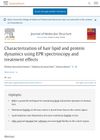 42 citations,
January 2021 in “Journal of Clinical Medicine”
42 citations,
January 2021 in “Journal of Clinical Medicine” Microneedle arrays with nanotechnology show promise for painless drug delivery through the skin but need more research on safety and effectiveness.
 16 citations,
August 2014 in “Colloids and surfaces. B, Biointerfaces”
16 citations,
August 2014 in “Colloids and surfaces. B, Biointerfaces” Lipid-coated silica nanoparticles penetrate human skin more deeply than bare silica nanoparticles.
 June 2015 in “Biomedical and biopharmaceutical research”
June 2015 in “Biomedical and biopharmaceutical research” The congress showed advancements in skin hydration, barrier function, and safe, effective new cosmetic formulations.
 28 citations,
March 2014 in “International Journal of Nanomedicine”
28 citations,
March 2014 in “International Journal of Nanomedicine” New lipid nanoparticles show promise for delivering hair loss treatments but need improvement for better skin penetration.
 22 citations,
March 2020 in “Cosmetics”
22 citations,
March 2020 in “Cosmetics” Nanotechnology improves minoxidil treatment for hair loss.
 February 2024 in “International Journal For Multidisciplinary Research”
February 2024 in “International Journal For Multidisciplinary Research” Nanostructured lipid carriers are effective for treating hyperpigmentation in women aged 30-40.
 October 2022 in “Journal of Kermanshah University of Medical Sciences”
October 2022 in “Journal of Kermanshah University of Medical Sciences” Different substances can affect how well the skin absorbs minoxidil, a hair loss drug. Caprylic acid helps the skin absorb it the best, followed by propylene glycol and water.
 10 citations,
April 2016 in “Research and reports in transdermal drug delivery”
10 citations,
April 2016 in “Research and reports in transdermal drug delivery” Transfollicular drug delivery is promising but needs more research to improve and understand it better.
 47 citations,
May 2021 in “Polymers”
47 citations,
May 2021 in “Polymers” Jojoba oil is highly valued for its diverse medicinal and industrial uses.
 7 citations,
October 2017 in “Artificial Cells Nanomedicine and Biotechnology”
7 citations,
October 2017 in “Artificial Cells Nanomedicine and Biotechnology” Finasteride-loaded ethosomes improve hair loss treatment by targeting pilosebaceous unit.
 23 citations,
March 2019 in “Environmental Chemistry Letters”
23 citations,
March 2019 in “Environmental Chemistry Letters” Cyclodextrins improve how steroid drugs work and are used in marketed medications and environmental applications.
 19 citations,
July 2020 in “Journal of drug delivery science and technology”
19 citations,
July 2020 in “Journal of drug delivery science and technology” Nanoemulsions with minoxidil and clove oil effectively target hair follicles for better alopecia treatment.
96 citations,
April 2017 in “Oncotarget” Smaller nanoemulsions can penetrate skin and hair follicles better, which may be useful for delivering drugs and vaccines through the skin.
 January 2025 in “AAPS PharmSciTech”
January 2025 in “AAPS PharmSciTech” Transethosomes improve drug delivery through the skin and show promise for treating various conditions.

Plant-based compounds can improve wound dressings and skin medication delivery.
 February 2023 in “International Journal of Pharmaceutics”
February 2023 in “International Journal of Pharmaceutics” A new version of minoxidil, a hair loss treatment, was made using nanotechnology. This version, called minoxidil cubosomes, works better and causes fewer skin reactions than the old version. It also penetrates and stays in the skin better, promoting hair regrowth. It's safe and could be a good alternative to current treatments.
 67 citations,
November 2019 in “Molecules”
67 citations,
November 2019 in “Molecules” Tea, especially green tea, shows promise in cosmetics for skin and hair benefits but more research is needed for effective use.
December 2022 in “Molecular Pharmaceutics” Latanoprost-loaded nanotransfersomes could help treat hair loss by promoting hair growth.
1 citations,
April 2022 in “Applied sciences” Bitter melon extract may help prevent hair loss and can be used in cosmetic products.
 November 2024 in “International Journal of Molecular Sciences”
November 2024 in “International Journal of Molecular Sciences” Nanoparticles may improve caffeine delivery for hair growth, offering a potential alternative to minoxidil for hair loss treatment.
 14 citations,
May 2022 in “Asian Journal of Pharmaceutical Sciences”
14 citations,
May 2022 in “Asian Journal of Pharmaceutical Sciences” New hair follicle-targeting treatments show promise for hair disorders but need more research on safety and effectiveness.
 127 citations,
June 2006 in “International Journal of Pharmaceutics”
127 citations,
June 2006 in “International Journal of Pharmaceutics” Liposomes and niosomes improve finasteride delivery for hair loss treatment.
 6 citations,
July 2009 in “Biomolecules & therapeutics”
6 citations,
July 2009 in “Biomolecules & therapeutics” Combining MSM with MAP significantly promotes hair growth.
 April 2019 in “Majalah Obat Tradisional”
April 2019 in “Majalah Obat Tradisional” Menthol boosts the hair growth effects of Phyllanthus niruri gel.
 19 citations,
May 2016 in “Clinical, cosmetic and investigational dermatology”
19 citations,
May 2016 in “Clinical, cosmetic and investigational dermatology” FGF-2&D/P nanoparticles can help treat hair loss.
 1 citations,
December 2023 in “Annals of Phytomedicine An International Journal”
1 citations,
December 2023 in “Annals of Phytomedicine An International Journal” Nanoemulgel improves delivery and effectiveness of plant-based drugs for various conditions.
 26 citations,
February 2020 in “International Journal of Biological Macromolecules”
26 citations,
February 2020 in “International Journal of Biological Macromolecules” Chitosan-coated dutasteride nanocapsules improve hair treatment, and physical stimulation boosts effectiveness.
 17 citations,
June 2021 in “Molecules”
17 citations,
June 2021 in “Molecules” Melatonin-loaded nanocarriers improve melatonin delivery and effectiveness for various medical treatments.
 1 citations,
August 2023 in “Gels”
1 citations,
August 2023 in “Gels” The hydrogel with silver and ibuprofen promotes wound healing and fights infection.
 December 2023 in “Journal of molecular structure”
December 2023 in “Journal of molecular structure” Hair treatments and dehydration affect hair's lipid and protein behavior, influencing its flexibility and appearance.


























